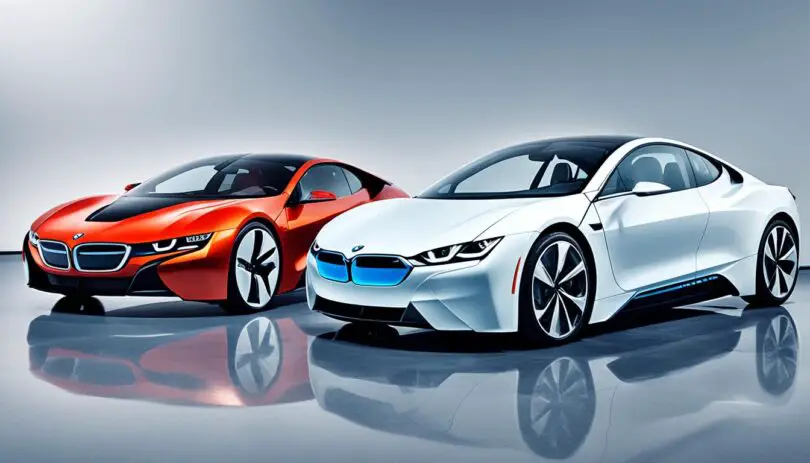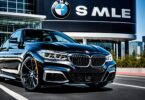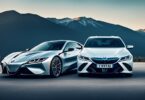Welcome to this article where we will compare BMW and Tesla to determine which brand leads in innovation and sustainability in the electric vehicle market. As the automotive industry continues to evolve, the demand for eco-friendly technology and sustainable transportation is on the rise. BMW and Tesla are two prominent players in this space, known for their luxury electric cars and commitment to green technology trends.
By examining their marketing strategies, product features, and engagement in sustainability, we aim to provide a comprehensive electric vehicle comparison that will help you make an informed decision when considering these innovative brands.
Key Takeaways:
- BMW and Tesla are leading brands in the electric vehicle market.
- Tesla is known for its disruptive marketing strategies and focus on sustainability.
- BMW leverages its brand heritage and offers a diverse range of electric cars.
- Both brands prioritize innovation and sustainable transportation solutions.
- The choice between BMW and Tesla ultimately depends on individual preferences and needs.
Tesla: The Disruptor
Tesla has revolutionized the automotive industry through its disruptive marketing strategies and forward-thinking approach. With a digital-first mindset, Tesla has harnessed the power of technology to create an immersive brand experience for its customers. By leveraging livestream events, online communities, and social media platforms, Tesla has successfully generated excitement and engagement around its products.
“Our goal when we created Tesla was to accelerate the advent of sustainable transportation.”
Tesla’s commitment to sustainability goes beyond marketing tactics. The company has positioned itself as a leader in the eco-friendly movement by focusing on clean energy products and reducing carbon emissions. This not only aligns with the growing demand for sustainable solutions but also sets Tesla apart from traditional automakers.
Tesla’s Innovative Product Features
One of Tesla’s key differentiators is its innovative product features. The company’s electric vehicles are equipped with cutting-edge technologies that enhance the driving experience and set new standards in the industry. Tesla’s Autopilot and Full Self-Driving capabilities have transformed the way we perceive transportation, offering a glimpse into the future of autonomous driving.
- Autopilot: Tesla’s advanced driver-assistance system allows for semi-autonomous driving, making long-distance journeys safer and more convenient.
- Full Self-Driving: This feature takes Autopilot to the next level, enabling the vehicle to navigate on its own, change lanes, and park with minimal human intervention.
- Supercharging Network: Tesla’s extensive Supercharger network provides fast and convenient charging options, reducing charging time and increasing the viability of electric vehicles.
Elon Musk: The Cult of Personality
An integral part of Tesla’s success is the cult of personality surrounding its CEO, Elon Musk. Known for his visionary leadership and charismatic personality, Musk has become synonymous with the Tesla brand. His ability to captivate audiences and his unyielding pursuit of innovation have solidified Tesla’s position as an industry frontrunner.
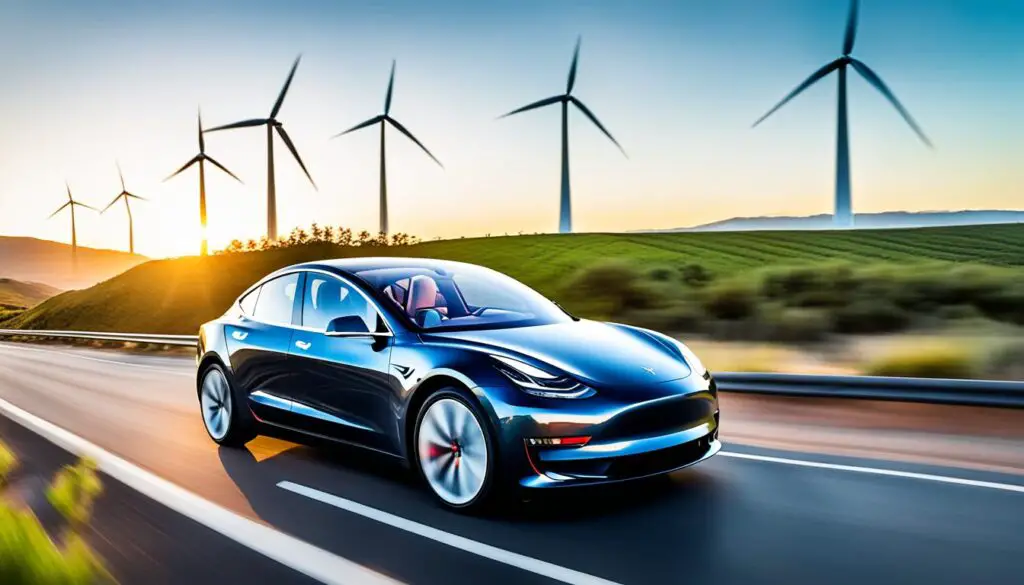
The image above showcases the Tesla Model 3, one of the company’s most popular and affordable electric vehicles. With its sleek design and impressive performance, the Model 3 exemplifies Tesla’s commitment to delivering innovative and sustainable transportation options.
BMW: The Legacy Brand
BMW, a legacy brand, is renowned for its rich heritage, performance, and luxury. Over the years, BMW has built a strong reputation in the automotive industry, making it a trusted choice for consumers around the world. With a diverse product portfolio, BMW caters to a wide range of preferences, ensuring that there is a BMW model for everyone.
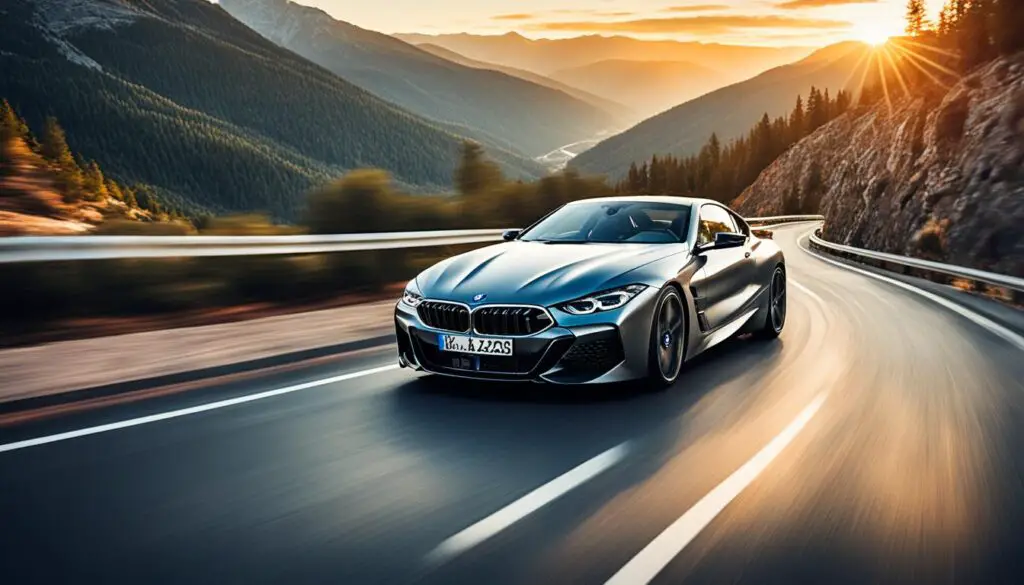
One of BMW’s notable achievements is its adaptation to the changing automotive landscape. Recognizing the importance of electric mobility, BMW has introduced the “i” series of electric cars, showcasing their commitment to innovation and sustainability. This forward-thinking approach allows BMW to meet the demands of eco-conscious consumers, providing them with luxury electric vehicles that align with their values.
Additionally, BMW actively engages in various sustainability initiatives and manufacturing processes. The company is dedicated to reducing its environmental impact and is continuously striving to implement eco-friendly practices throughout its operations. BMW’s engagement in sustainability reflects its commitment to a greener future for the automotive industry.
BMW’s Legacy and Performance
BMW’s brand heritage plays a significant role in its success. The company’s legacy is built on a long-standing tradition of crafting high-performance vehicles that offer a thrilling driving experience. Car enthusiasts and fans of BMW appreciate the brand’s commitment to excellence and the meticulous attention to detail that goes into every vehicle.
BMW’s performance-oriented vehicles provide power, precision, and exceptional handling, making them a top choice for those seeking a thrilling driving experience. From the iconic M Series to the luxurious 7 Series, BMW offers a wide range of models that cater to different performance preferences.
| Model | Performance Features |
|---|---|
| BMW M4 | Powerful Twin-Turbocharged Engine, M-Specific Design Features, High-Performance Braking System |
| BMW 3 Series | Dynamic Driving Dynamics, Balanced Handling, Responsive Turbocharged Engines |
| BMW 7 Series | Smooth and Powerful Engines, Advanced Suspension System, Luxurious Interior Comfort |
Embracing Innovation and Advancing Technology
BMW is dedicated to staying at the forefront of automotive innovation. The company continuously pushes the boundaries of technology and embraces new advancements to enhance the driving experience for its customers. With state-of-the-art features and cutting-edge technology, BMW vehicles offer convenience, safety, and a seamless integration of digital capabilities.
BMW’s commitment to innovation is reflected in its advanced driver assistance systems, intuitive infotainment systems, and connectivity features. For example, the BMW Intelligent Personal Assistant allows drivers to control various functions through voice commands, creating a more interactive and hands-free experience behind the wheel.
“At BMW, we believe that innovation and technology should serve to enhance the driving experience. Our commitment to delivering cutting-edge features and seamless connectivity is at the heart of everything we do.”
– BMW Executive
Sustainability and Eco-Friendly Practices
BMW recognizes the importance of sustainability and actively engages in eco-friendly practices. The company strives to reduce its carbon footprint by implementing sustainable solutions throughout its manufacturing processes and supply chain. BMW’s commitment to sustainability extends beyond its electric vehicles, encompassing all aspects of its operations.
- Efficient Energy Usage: BMW has implemented energy-saving measures in its factories to minimize energy consumption and optimize efficiency.
- Water Conservation: BMW aims to reduce water usage and employ responsible water management practices in its manufacturing facilities.
- Recycling Programs: The company promotes recycling and the use of recycled materials, ensuring responsible waste management.
Both Brands’ Marketing Strategies and Target Audience
Marketing strategies play a crucial role in shaping a brand’s image and reaching its target audience. In the case of Tesla and BMW, both brands have unique approaches that reflect their identity and appeal to different segments of the market.
Tesla’s Target Audience: Tech-Savvy & Environmentally Conscious Consumers
Tesla’s marketing strategy targets individuals who value cutting-edge innovation and sustainable transportation solutions. The brand appeals to tech-savvy consumers who embrace new technologies and have a strong environmental consciousness. By positioning themselves as pioneers in the electric vehicle industry, Tesla has successfully captured the attention and loyalty of this specific audience.
Tesla’s marketing efforts emphasize their commitment to innovation and sustainability, and they leverage digital platforms to engage with their target audience. Their digital-first approach, including livestream events and online communities, create a sense of community and excitement around the brand. Tesla’s focus on eco-friendly technology trends resonates with consumers who prioritize reducing their carbon footprint and supporting environmentally friendly products.
BWM’s Target Audience: Performance, Luxury, & Rich Heritage Seekers
BMW’s marketing strategy takes a different approach, leveraging their legacy and appealing to a broad spectrum of consumers. The brand targets individuals who value performance, luxury, and a brand with a rich heritage. BMW positions itself as a symbol of status and sophistication, appealing to customers who seek a premium and prestigious driving experience.
BMW’s diverse product portfolio is designed to cater to various consumer preferences and showcases their commitment to innovation adaptation. The brand actively engages in sustainability initiatives and manufacturing processes, aligning with global eco-friendly practices. By emphasizing their dedication to sustainability, BMW attracts consumers who want to experience the latest advancements in automotive technology without compromising on performance and luxury.
“Tesla targets tech-savvy, environmentally conscious consumers, while BMW appeals to those seeking performance, luxury, and a rich heritage.”
Comparison of Marketing Strategies and Target Audience
Both Tesla and BMW have successfully carved out their niche in the electric vehicle market by appealing to different target audiences. Tesla’s marketing strategies revolve around innovation and sustainability, capturing the attention of tech-savvy, eco-conscious consumers. On the other hand, BMW’s marketing approach leverages its legacy and attracts individuals seeking performance and luxury.
| Tesla | BMW | |
|---|---|---|
| Marketing Strategy | Tech-focused, sustainability-driven | Legacy-driven, performance-centric |
| Target Audience | Tech-savvy, eco-conscious consumers | Performance, luxury, and heritage seekers |
This table summarizes the key differences in marketing strategies and target audiences between Tesla and BMW.
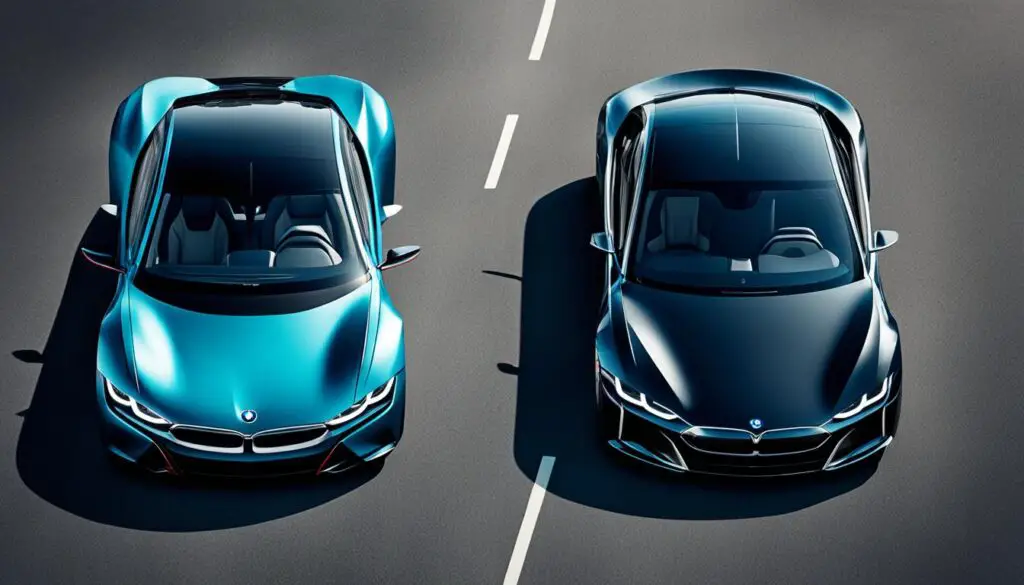
Product Range and Innovation
When it comes to product range and innovation, both BMW and Tesla are at the forefront of the electric vehicle market, offering cutting-edge features that push the boundaries of technology.
BMW: The German automaker boasts a wide range of vehicles, from sports cars to SUVs, each showcasing advanced features and superior craftsmanship. However, it is their “i” series of electric cars that truly highlight their commitment to innovation. The BMW “i” series combines stunning design with sustainable engineering, delivering impressive electric vehicle range and a driving experience like no other.
Tesla: The American electric car manufacturer has made waves with its Model S, Model 3, Model X, and Model Y. Each model offers impressive electric vehicle range and a host of advanced features. Tesla’s relentless pursuit of innovation has resulted in groundbreaking technologies such as Autopilot and the Full Self-Driving capability, revolutionizing the way we drive.
Both BMW and Tesla continue to push the boundaries of electric vehicle technology and innovation, setting the stage for a future of sustainable transportation.
Price Range and Charging Infrastructure
When it comes to purchasing an electric vehicle, price range and charging infrastructure are important factors to consider. Both BMW and Tesla offer a range of models at varying price points.
For BMW, the price range starts at around $35,000 and goes up to $160,000 or more, depending on the model and trim level. Tesla vehicles, on the other hand, have a price range starting at approximately $35,000 and going up to $150,000. These prices offer a wide selection to meet different budgetary needs and preferences.
Another key aspect to consider is the charging infrastructure. BMW has an extensive network of charging stations, making it convenient for BMW electric vehicle owners to find a charging point. On the other hand, Tesla has its Supercharger network, which provides fast and convenient charging options for Tesla electric vehicle owners.
These charging infrastructures reflect the brands’ commitment to supporting their electric vehicle owners and ensuring they have access to reliable and efficient charging options.
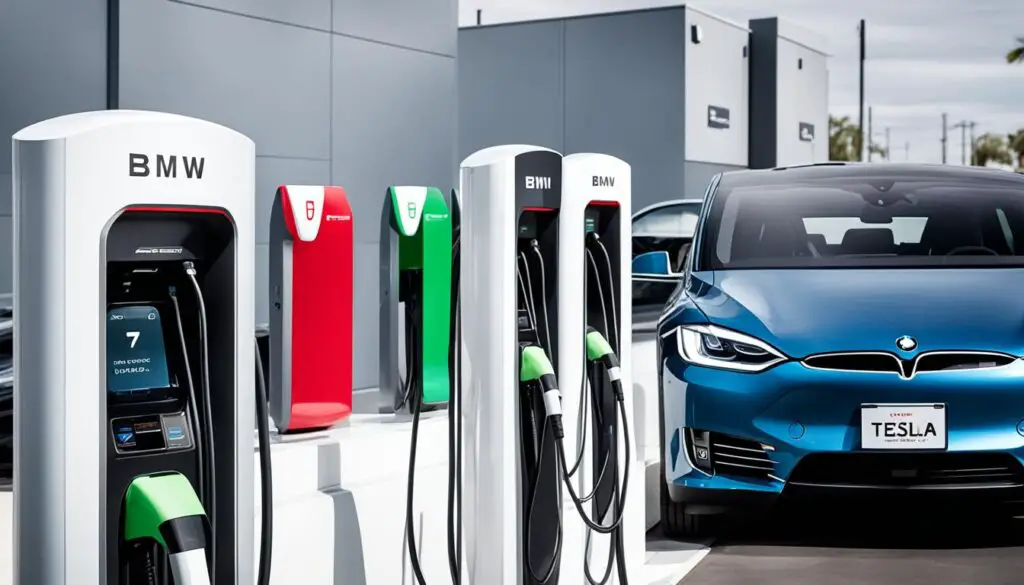
Comparison of Performance and Features
When it comes to performance and features, both BMW and Tesla have a lot to offer. BMW is renowned for its exceptional acceleration, precise handling, and luxurious features that provide a thrilling driving experience. Tesla, on the other hand, shines in terms of electric range, impressive acceleration, and advanced autonomous driving capabilities. Safety is a top priority for both brands, and they incorporate innovative technologies to ensure the well-being of their drivers and passengers.
Let’s take a closer look at the performance and features of each brand:
| Brand | Performance | Features |
|---|---|---|
| BMW | Exceptional acceleration and handling Luxurious features and comfort |
– Advanced infotainment systems – Cutting-edge driver assistance – Premium audio systems |
| Tesla | Impressive electric range Rapid acceleration Autonomous driving capabilities |
– State-of-the-art touchscreens – Over-the-air software updates – Enhanced autopilot functionality |
Both BMW and Tesla continuously push the boundaries of automotive technology, integrating advanced features and systems to enhance the driving experience. Whether you prioritize exhilarating performance or long electric range, both brands offer an impressive range of options to cater to your preferences.
As you can see, the image highlights the key features and performance aspects that make BMW and Tesla stand out in the electric vehicle market. It visually represents the exciting innovations and advanced technologies that define these brands.
Conclusion
In conclusion, both BMW and Tesla are leading brands in the electric vehicle market. The competition between these brands drives innovation and plays a significant role in shaping the future of sustainable transportation.
Tesla, with its disruptive marketing strategies and unwavering focus on sustainability, has propelled itself to the forefront of innovation. The company’s digital-first approach, combined with its emphasis on clean energy products, has garnered a cult-like following and positioned Tesla as an industry leader. Their commitment to pushing the boundaries of electric vehicle technology and their charismatic CEO, Elon Musk, have further solidified their position in the market.
On the other hand, BMW, as a legacy brand, capitalizes on its brand heritage and diverse product portfolio. With a range of vehicles that cater to various consumer preferences, BMW appeals to a wide range of customers. The company has adapted to the evolving automotive landscape by introducing its “i” series of electric cars and actively engaging in sustainability initiatives. BMW’s commitment to innovation, coupled with its focus on performance and luxury, ensures its relevance in the electric vehicle market.
Ultimately, the choice between BMW and Tesla depends on individual preferences and needs. While Tesla excels in disruptive marketing and cutting-edge product features, BMW offers a combination of legacy, diversity, and performance. Both brands, however, share a common goal of revolutionizing transportation with sustainable and eco-friendly solutions, ensuring a greener and more innovative future.

